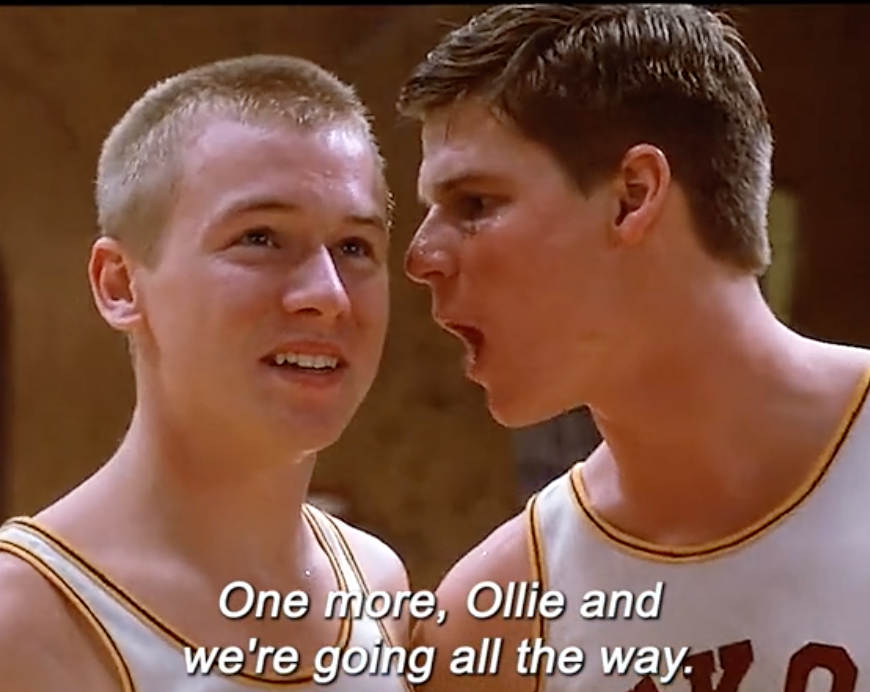“Just One More”
In one of the most dramatic scenes of "Hoosiers," three seconds are left in the state semi-final game, and Indiana's Cinderella team, Hickory, needs two points to advance. There's one problem: a player who rarely plays is now at the line, and it's all in his hands.
Ollie, the team’s last man off the bench, was fouled while shooting, so he now has two free throws: the first to tie the game and, if he makes the second one, to win the game.
Everyone is understandably excited!
What should teammates and coaches say to Ollie that will help his mindset?
Not what they said, that’s for sure.
His head coach and teammate offer encouragement by enthusiastically reminding him that they need "One more!"
Ouch.
While this phrase may seem supportive, it's not—not even a little bit. It can and usually intensifies the pressure during a high-stress moment.
No one performs better under pressure or stress, whether literal or figurative. Even NFL quarterbacks like Tom Brady or Patrick Mahomes play worse when facing blitz pressure. Internal pressure is just as detrimental, if not worse.
No one excels when they tell themselves or are told by someone else, "It's do or die," "It's now or never," “If it’s to be, it’s up to me”, and so on.
So, when Ollie, the self-proclaimed 'worst player on the team,' is shooting, his teammate and coach add stress and pressure by reminding him that if he makes "Just one more," they will win.
Focus on Outcome, Not Process: By saying "one more," they're emphasizing the result—the next free throw—which can increase the pressure on Ollie. Focusing too much on the outcome in high-pressure situations can lead to overthinking and anxiety, affecting performance.
Internal Pressure: Ollie already knows that making the shot is critical, and being reminded of that can create more internal pressure. His focus should ideally be on his routine or the shot's mechanics rather than the moment's significance.
Distraction from Mental Focus: Athletes often rely on routine and concentration to perform in clutch moments. The phrase "one more" can pull Ollie out of his rhythm or mental routine and make him more self-conscious. "Just one more" probably amplified the ramifications of missing the shot, which increases the chances of tightening up or second-guessing. Keeping calm and staying in the present moment is key to clutch performance.
What they should have said to Ollie was:
“Trust your training”
“Focus on your form” or
“You were built for this”
This would allow him to stay calm and in the flow rather than worrying about the weight of the shot.
The best example of this situation in football is a kicker lining up the game-winning kick. If we were to say, "Make it and we win," it’d be the wrong thing to say because it would shift their focus from the process of executing the kick to the pressure of the outcome. Again, it’s counterproductive because: it emphasizes the end result-the game's outcome- which is something the kicker can't control directly. This kind of focus can increase anxiety as the athlete starts thinking about the larger stakes rather than just the task at hand.
Justin Tucker, arguably the greatest kicker in NFL history, said this in an interview after a game-winning kick: "I'd be lying to you if I said I'm not just a little bit nervous and thinking about the worst-case scenario.”
“But it's really important to take those 1.3 seconds between the snap, the hold, and the kick and focus on the nuts and bolts of what's going to make the kick.”
“My feelings don't matter. What matters is seeing the ball snapped with 12 o'clock laces and spotted cleanly; then, I'm just a system kicker. The ball kicks itself from there. All were really thinking about are those things that are going to make the kick.”
When one of your players has a 'big moment' don't remind them whats at stake and add pressure. Give them confidence and the phrase 'Trust your training' because all any of us can do to perform our best is to have a system and trust it.

